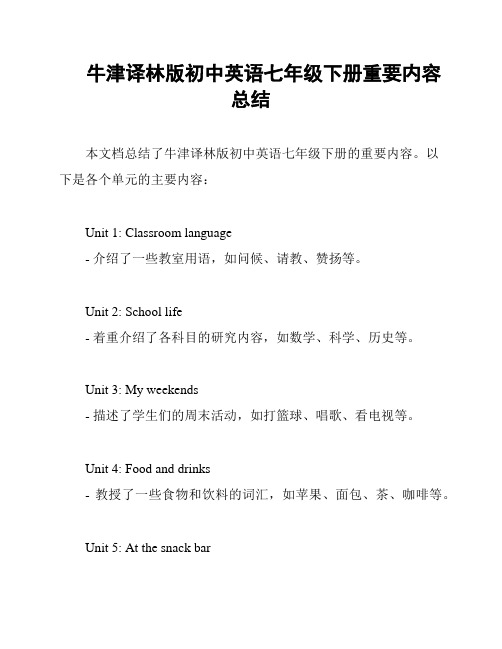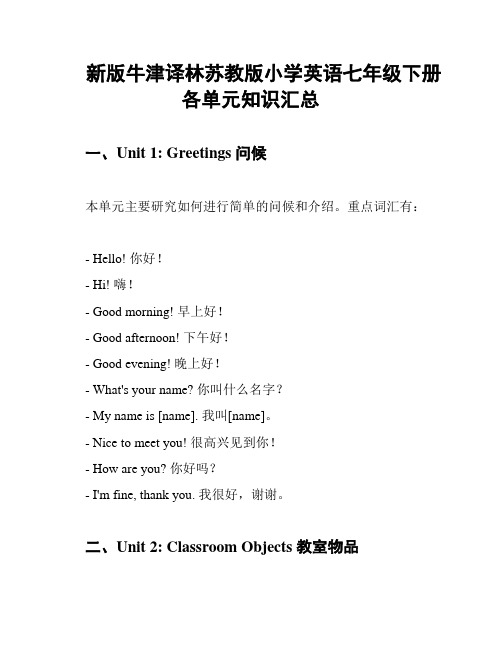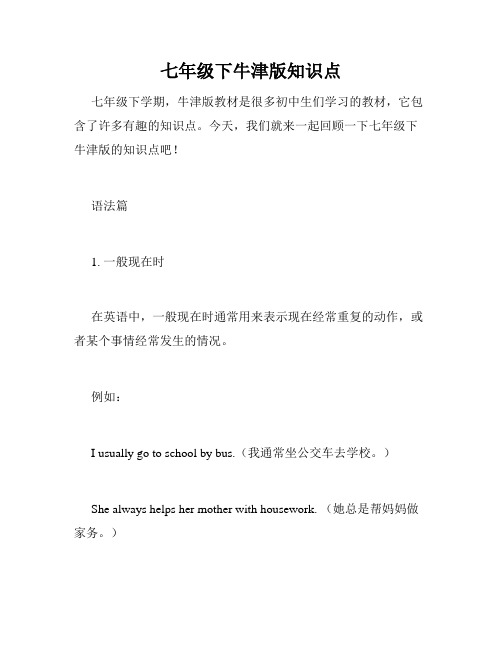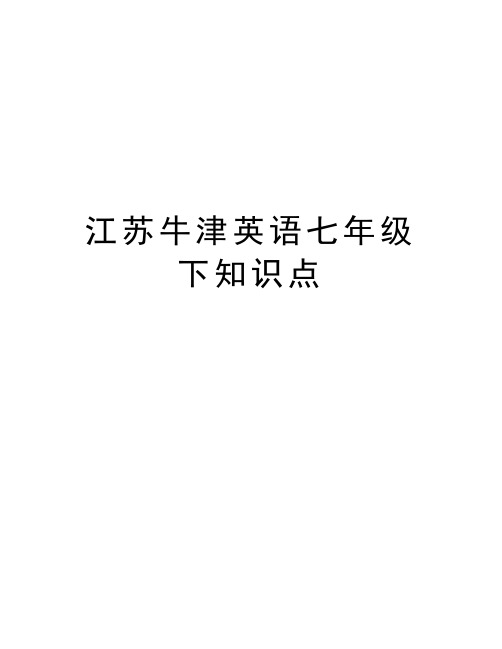江苏牛津英语七年级下知识点
牛津译林版初中英语七年级下册重要内容总结

牛津译林版初中英语七年级下册重要内容
总结
本文档总结了牛津译林版初中英语七年级下册的重要内容。
以
下是各个单元的主要内容:
Unit 1: Classroom language
- 介绍了一些教室用语,如问候、请教、赞扬等。
Unit 2: School life
- 着重介绍了各科目的研究内容,如数学、科学、历史等。
Unit 3: My weekends
- 描述了学生们的周末活动,如打篮球、唱歌、看电视等。
Unit 4: Food and drinks
- 教授了一些食物和饮料的词汇,如苹果、面包、茶、咖啡等。
Unit 5: At the snack bar
- 研究了在小吃店点餐的常用句型,如“What would you like?”、“Here you are.”等。
Unit 6: Festivals and celebrations
- 介绍了一些重要的节日和庆祝活动,如春节、圣诞节、生日等。
Unit 7: Hobbies
- 研究了各种爱好和运动,如阅读、游泳、踢足球等。
Unit 8: At the zoo
- 通过描述动物的外貌和生活性,使学生了解不同的动物种类。
Unit 9: My body and health
- 关注了身体部位和健康问题,如头、肚子、感冒、发烧等。
Unit 10: My family
- 描述了家庭成员的关系和工作,如爸爸、妈妈、姐姐、弟弟等。
这些是牛津译林版初中英语七年级下册的重要内容总结。
希望能对您有所帮助!。
新版牛津译林苏教版小学英语七年级下册各单元知识汇总

新版牛津译林苏教版小学英语七年级下册各单元知识汇总一、Unit 1: Greetings 问候本单元主要研究如何进行简单的问候和介绍。
重点词汇有:- Hello! 你好!- Hi! 嗨!- Good morning! 早上好!- Good afternoon! 下午好!- Good evening! 晚上好!- What's your name? 你叫什么名字?- My name is [name]. 我叫[name]。
- Nice to meet you! 很高兴见到你!- How are you? 你好吗?- I'm fine, thank you. 我很好,谢谢。
二、Unit 2: Classroom Objects 教室物品本单元主要研究教室里常见的物品。
重点词汇有:- desk 课桌- chair 椅子- book 书- pen 笔- pencil 铅笔- ruler 尺子- eraser 橡皮擦- bag 书包- notebook 笔记本- blackboard 黑板三、Unit 3: Numbers 数字本单元主要研究基本的数字表达。
重点词汇有:- one 一- two 二- three 三- four 四- five 五- six 六- seven 七- eight 八- nine 九- ten 十四、Unit 4: Family 家庭本单元主要研究家庭成员的称呼。
重点词汇有:- father 父亲- mother 母亲- brother 兄弟- sister 姐妹- grandfather 爷爷- grandmother 奶奶- aunt 阿姨- uncle 叔叔- cousin 堂兄弟/堂姐妹五、Unit 5: Colors 颜色本单元主要研究颜色的表达。
重点词汇有:- red 红色- blue 蓝色- yellow 黄色- green 绿色- orange 橙色- purple 紫色- black 黑色- white 白色- pink 粉色- brown 棕色六、Unit 6: Weather 天气本单元主要研究天气的描述。
七年级下牛津版知识点

七年级下牛津版知识点七年级下学期,牛津版教材是很多初中生们学习的教材,它包含了许多有趣的知识点。
今天,我们就来一起回顾一下七年级下牛津版的知识点吧!语法篇1. 一般现在时在英语中,一般现在时通常用来表示现在经常重复的动作,或者某个事情经常发生的情况。
例如:I usually go to school by bus.(我通常坐公交车去学校。
)She always helps her mother with housework. (她总是帮妈妈做家务。
)2. 简单过去式简单过去式一般用于描述过去发生的一件事情,比如我们讲述自己的经历时,就会用到简单过去式。
通常我们会在动词原形后加上“-ed”形式的过去式。
例如:He visited the museum yesterday. (他昨天参观了博物馆。
)I watched TV last night. (昨晚我看了电视。
)3. 一般将来时一般将来时用于描述将来某个时间会发生的事情,通常我们会在动词原形前加上助动词“will”。
例如:I will go to the beach with my family next weekend.(下个周末我会和家人去海边。
)We will have a party next month to celebrate his birthday.(下个月我们会开派对庆祝他的生日。
)词汇篇1. 学科名词学科名词是指与各门学科相关的专业词汇,这些词汇通常用于描述学科的内容和特点。
例如:mathematics(数学)、physics(物理)、biology(生物)、chemistry(化学)、history(历史)、geography(地理)等。
2. 颜色词汇颜色词汇指的是用来描述物体颜色的词汇。
例如:red(红色)、blue(蓝色)、green(绿色)、yellow(黄色)、orange(橙色)、purple(紫色)等。
3. 运动名词运动名词是指各种体育运动的名称,这些词汇通常用来描述各种运动比赛的场景和规则。
江苏牛津英语七年级下知识点电子教案

江苏牛津英语七年级下知识点Unit One知识点:1.If引导的条件状语从句,表示如果......,当主句是一般将来时,从句用一般现在时.I won`t go there with you if it rains tomorrow.Have a good rest if you are tired.You must see the doctor if you are ill.2.It is +形容词+that 从句(表达对某事的看法)It is wonderful that we can have dinner on the 91st floor in Shanghai World Financial Center.3.It is +形容词+带to 的动词不定式表达对某事的看法It is terrible to have dinner in this restaurant.4.take sb. to some place 将某人带到某地5.in + 一段时间”的结构有两种含义(1) 表示“在一段时间以内”,句子常用一般现在时或一般过去时。
There was once an artist. He could draw a beautiful horse in five minutes.(2)表示“在一段时间之后”,句子常用一般将来式What will you be like in 20 years` time? 20年后你将长成什么样子?句型与短语:1.be famous/known for sth. 因为......而著名e.g. Shanghai is famous/known for its night views.2.be famous/known as sth. 作为......而著名e.g. Shanghai is famous/known as the “Shopping Paradise”3.one of +adj.(最高级)+n.(复数)Shanghai is one of the biggest cities in the world.4.decide to do sth. 决定做某事Decide not to do sth. 决定不做某事Make a decision 做出决定5.take part in 参加活动6.join 参加或加入某种组织或团体7.design 名词计划\设计\图样动词设计\画图样8.go sightseeing 去观光9.in the center of ...... 位于.......的中部10.in the south of...... 位于......的南部11.on Chongming Island 位于崇明岛上12.get on with 进展13.therefore 因此,所以14.district 地区,区域16.Meglev= magnetic levitation 磁悬浮列车17.a huge open area 大型的开放式区域18.a downtown shopping plaza 市中心的购物中心19.a cruise ship 载客长途航行的游轮20.think of 想出21.tour ----- tourist science ------ scientist type ------ typist cycle------ cyclistdentist -----artist22.design ------ designer23.Make some suggestions/Make some advice/Give sb. some advice/Take one`sadvice24.suggest sb. do sth.25.north---northeast ------ east ------ southeast -----south ------ southwest ------ west ------ northwest ------ north26.People`s Square 人民广场Yu Garden 豫园Suzhou Creek 苏州河The Bund 外滩Shanghai Grand Theatre 上海大剧院Shanghai Botanical Gardens 上海植物园Oriental Pearl TV Tower 东方明珠电视塔Century Park 世纪公园Shanghai Science and Technology Museum 上海科技馆Shanghai Wild Animal Park 上海野生动物园Dongping National Forest Park 东平国家森林公园Sheshan State Resort 佘山国家旅游度假区Grand Gateway Plaza 港汇广场27.in the centre/south/...of Shanghai 在上海的中/南/....部28.Therefore, it is not surprising that many tourists come to visit Shanghai everyyear to shop!所以,每年有许多游客来上海购物也就不足为奇了。
七年级牛津英语下册知识点

七年级牛津英语下册知识点七年级是英语学习的关键阶段之一。
在这一阶段,学生们需要学习基本的英语语法、词汇和句子结构,同时也需要掌握一些牛津英语下册的知识点。
下面将介绍一些七年级牛津英语下册知识点,帮助大家更好地学习英语。
一、动词的时态和语态动词的时态和语态是英语学习的重要部分。
在七年级牛津英语下册中,学生需要学习基本的时态和语态,并能正确运用。
下面是一些常用的时态和语态:1. 一般现在时2. 一般过去时3. 一般将来时4. 现在进行时5. 过去进行时6. 将来进行时7. 现在完成时8. 过去完成时9. 将来完成时10. 被动语态二、名词和名词性物名词是英语语法的重要组成部分,学生们需要掌握名词的基本概念和分类。
此外,名词性物也是七年级牛津英语下册中的重要知识点。
下面是一些常见的名词和名词性物:1. 可数名词和不可数名词2. 可数名词的单数和复数形式3. 不可数名词的用法和分类4. 名词所有格5. 名词性物的用法和分类三、形容词和副词形容词和副词也是英语语法的重要组成部分,学生们需要学习它们的用法和分类。
下面是一些常见的形容词和副词:1. 形容词的用法和分类2. 比较级和最高级形容词3. 形容词和副词的比较级和最高级四、连词和介词连词和介词是七年级牛津英语下册中的另一个重要知识点。
学生需要学习它们的用法和分类。
下面是一些常见的连词和介词:1. 并列连词和从属连词2. 表示时间、地点和方向的介词3. 表示目的、原因、条件和方式的介词五、口语交际英语口语交际是七年级牛津英语下册的重要内容之一。
学生需要掌握一些基本的口语表达和交际技巧,以便在实际交流中能够更好地理解和表达。
下面是一些常用的口语表达和交际技巧:1. 问答句的构造和回答2. 请求、允许、拒绝和建议的表达方式3. 感谢、道歉、祝贺和邀请的表达方式以上是七年级牛津英语下册的一些重要知识点,希望能够帮助大家更好地学习英语。
当然,这些知识点只是冰山一角,大家还需要不断地学习和积累,才能在英语学习中不断提高。
译林版牛津英语七年级下册全册Unites1-8单元知识点及语法归纳

译林版牛津英语七年级下册全册Unites1-8单元知识
点及语法归纳
以下是译林版牛津英语七年级下册全册Unites1-8单元的知识点及语法归纳。
Unit 1 Knowing about yourself 知识点:
1. 询问和介绍自己的姓名、年龄、国籍以及所在地等。
2. 描述自己的外貌特征、爱好和能力。
3. 学习使用形容词、副词、名词、动词等词汇来构造自己的句子。
4. 学会听、说、读、写26个字母。
语法归纳:
1. 人称代词:I, you, he, she, it, we, they.
2. 动词be的各种形式(am, is, are)。
3. 形容词的比较级和最高级形式。
4. 副词和形容词的用法。
5. 一般现在时的肯定句、否定句及一般疑问句。
Unit 2 Disaster zone 知识点:
1. 描述自然灾害的发生和后果。
2. 学习句式\。
七年级牛津英语七下知识点

七年级牛津英语七下知识点牛津英语是英语学习中的一大品牌,而七年级牛津英语七下的知识点也是许多学生正在苦苦寻找及学习的内容。
下面,我们就来详细探讨一下这些知识点。
1. Unit 1: Hello!这个单元主要是介绍如何打招呼及自我介绍的相关表达。
包括问候语、称呼以及问候的方式等。
2. Unit 2: My Day这个单元重点是谈论日常生活及自己的日常安排。
包括动词的现在进行时,不同的日常活动,以及时间的表达方式等。
3. Unit 3: At School这个单元主要涉及学校及学校生活相关的话题,如教室、科目、课程表等。
还包括缩写及赞扬的方式等。
4. Unit 4: My Family and My Friends这个单元关注的是家庭及朋友的话题。
涵盖如何描述家庭成员及朋友,以及描述他们的特点。
同时还包括形容词的用法及比较等知识点。
5. Unit 5: Food and Drink这个单元主要是围绕食品和饮料展开的。
介绍各种食品、饮料以及描述它们味道的形容词。
同时还涉及到量词的使用及食品的制作方法等方面。
6. Unit 6: Holidays这个单元主要关注节日及假期的话题。
涉及到各种节日的庆祝方式及其特点。
还包括旅游及住宿的相关知识等。
7. Unit 7: Festivals这个单元也涉及到节日及庆祝的话题,但是更注重各种文化节日。
介绍不同国家及地区的文化习俗及庆祝方式。
8. Unit 8: Time这个单元主要讲解时间的相关知识。
包括时间的表达方式、描述日常活动的时间等。
同时还探讨其他和时间相关的词汇。
9. Unit 9: At Home and Abroad这个单元则是介绍旅游及住宿话题。
包括旅游计划、住宿方式及交通等内容。
同时还探讨一些旅游相关的实用英语口语。
10. Unit 10: The Natural World这个单元主要是介绍自然界的相关话题。
涵盖天气、气候、动物及植物等方面。
同时还探讨英语口语中描述大自然的相关单词及短语等。
新牛津译林版英语七年级下册重点语法知识

七年级英语语法重点知识1. 一般现在时:表示表示通常性、规律性、习惯性的状态或者动作(有时间规律发生的事件)的一种时间状态。
在一般现在时中,当动词是实义动词,主语是第三人称单数时,谓语动词要用第三人称单数形式,即常在动词原形后加-s或-es。
第三人称单数构成规则(1)大多数动词直接加s (2) 以辅音字母加y结尾,去y加ies (3) 以s\x\ch\sh结尾加es (4) 以o结尾部分加es (5)have 的三单是has一般现在时做题规则:(1)一看是否有be(am\is\are),肯定句直接用am\is\are, 我用am,你、我们、你们、他们都用are, is用于他、她、它。
否定句be(am\is\are)后加not.一般疑问句一、二人称要互换,我换你,我的换你的,我们换你们,我们的换你们的,Be(am\is\are)移动到句首。
(2)二看实意动词分两类:一类非三单肯定句实意动词用原形,否定动词原形前加个don’t,一般疑问句一、二人称要互换,我换你,我的换你的,我们换你们,我们的换你们的,句首加个do。
(3)二类是三单包括她、他、它,XX。
三单肯定句实意动词用V-s\es, 三单否定句动词前面加doesn’t,动词必须回到用原形,一般疑问句一、二人称要互换,我换你,我的换你的,我们换你们,我们的换你们的,句首加个does, 动词必须回到用原形。
2. 现在进行时表示说话时正在进行的动作;表示现阶段正在进行着的动作但不一定是说话时正在进行。
常和now连用,有时用一个动词如look(看)、listen(听)来表示now(现在)这一时间概念。
常和at present(目前)、this week(本周)、these days(这几天)等时间状语连用。
现在进行时肯定句am\is\are+V-ing, 否定句am\is\are+not+V-ing,一般疑问句一般疑问句一、二人称要互换,我换你,我的换你的,我们换你们,我们的换你们的,Be(am\is\are)移动到句首。
- 1、下载文档前请自行甄别文档内容的完整性,平台不提供额外的编辑、内容补充、找答案等附加服务。
- 2、"仅部分预览"的文档,不可在线预览部分如存在完整性等问题,可反馈申请退款(可完整预览的文档不适用该条件!)。
- 3、如文档侵犯您的权益,请联系客服反馈,我们会尽快为您处理(人工客服工作时间:9:00-18:30)。
Unit One知识点:1.If引导的条件状语从句,表示如果......,当主句是一般将来时,从句用一般现在时.I won`t go there with you if it rains tomorrow.Have a good rest if you are tired.You must see the doctor if you are ill.2.It is +形容词+that 从句(表达对某事的看法)It is wonderful that we can have dinner on the 91st floor in Shanghai World Financial Center.3.It is +形容词+带to 的动词不定式表达对某事的看法It is terrible to have dinner in this restaurant.4.take sb. to some place 将某人带到某地5.in + 一段时间”的结构有两种含义(1) 表示“在一段时间以内”,句子常用一般现在时或一般过去时。
There was once an artist. He could draw a beautiful horse in five minutes.(2)表示“在一段时间之后”,句子常用一般将来式What will you be like in 20 years` time? 20年后你将长成什么样子?句型与短语:1.be famous/known for sth. 因为......而著名e.g. Shanghai is famous/known for its night views.2.be famous/known as sth. 作为......而著名e.g. Shanghai is famous/known as the “Shopping Paradise”3.one of +adj.(最高级)+n.(复数)Shanghai is one of the biggest cities in the world.4.decide to do sth. 决定做某事Decide not to do sth. 决定不做某事Make a decision 做出决定5.take part in 参加活动6.join 参加或加入某种组织或团体7.design 名词计划\设计\图样动词设计\画图样8.go sightseeing 去观光9.in the center of ...... 位于.......的中部10.in the south of...... 位于......的南部11.on Chongming Island 位于崇明岛上12.get on with 进展13.therefore 因此,所以14.district 地区,区域16.Meglev= magnetic levitation 磁悬浮列车17. a huge open area 大型的开放式区域18. a downtown shopping plaza 市中心的购物中心19. a cruise ship 载客长途航行的游轮20.think of 想出21.tour ----- tourist science ------ scientist type ------ typist cycle------ cyclistdentist -----artist22.design ------ designer23.Make some suggestions/Make some advice/Give sb. some advice/Take one`s advice24.suggest sb. do sth.25.north---northeast ------ east ------ southeast -----south ------ southwest ------ west ------northwest ------ north26.People`s Square 人民广场Yu Garden 豫园Suzhou Creek 苏州河The Bund 外滩Shanghai Grand Theatre 上海大剧院Shanghai Botanical Gardens 上海植物园Oriental Pearl TV Tower 东方明珠电视塔Century Park 世纪公园Shanghai Science and Technology Museum 上海科技馆Shanghai Wild Animal Park 上海野生动物园Dongping National Forest Park 东平国家森林公园Sheshan State Resort 佘山国家旅游度假区Grand Gateway Plaza 港汇广场27.in the centre/south/...of Shanghai 在上海的中/南/....部28.Therefore, it is not surprising that many tourists come to visit Shanghai every year to shop!所以,每年有许多游客来上海购物也就不足为奇了。
29.There are many bridges and tunnels, so it is convenient to travel between Pudong and Puxi.众多的桥梁和隧道使浦东和浦西之间的交通往返变的很方便。
句中的it是指to travel between Pudong and Puxi.Unit two知识点1.电话用语(1)电话用语中使用This is ... 和Is that ...?来表示“我是......”和“你是.....”?May I speak to... 表示“我能与......通话?”如果表示接电话的是本人,则回答:This is speaking.(或直接说Speaking) (2)电话途中需中断一会儿,或者接电话的不是本人,则用: Hold on. 别挂或I`ll be back in a moment. 我一会儿就回来2.So... I...(我也......) Neither ... I...(我也不......)e.g. She is going to have a rest tomorrow.So am I.They would not go to the shopping mall.Neither would I.3.指路用语(1) Turn left /right (向左/右转)Turn left/right into... (向左/右转到......路)(2)Walk along ... (沿着......路走)(3)You will find... on your left/right 你就会看到......在你的左/右边句型与短语1.be full of 表示充满了......(强调一种状态)This jar is full of beans.2.be filled with 表示充满了......(强调填满这个动作)This bottle is filled with water.(Someone has filled this bottle with water.)3.take a look 看一看4.film guide 电影指南5.very much 非常, 常放在句末用来修饰句中的动词I like funny films very much.6.action film 动作片cartoon 卡通片love story 爱情电影7.in space 在太空中,在宇宙中There are many different kinds of stars in space.8.in the space 在......空间里We can put nothing in the space between two desks.9.miss 错过Hurry up, or you will miss the early bus.miss 想念I miss you very much.10.far away 遥远11.pay for 为......付钱12.sb. fill sth. with sth. 某人将某物充满某物13.keep a record of 记下,有......记录14.explorer 探险者15.travel through space 环游宇宙16.ahead of 在前17.The earth is getting very small. 地球变小了.It is getting dark. 天变黑了.Unit three知识点1.Since 从......以来;自从Since 只用于时间前,意指从那时起,它常常和现在完成时连用。
也可接一个表示时间点的时间状语从句。
He has worked for us ever since he left school.It has been two years since I last saw Tom.2.For 用来表示一段时间如for six years 六年之久,for two months 有两个月He has worked here for a year.3.现在完成时的基本结构是:have/has + 动词的过去分词表示某个动作发生的起点在过去,这个动作一直持续到现在,并还可能持续下去。
这样的句子通常会加上for 或since 引起的时间状语。
注意:现在完成时结构中的动词需使用持续性动词,而不可使用短暂性动词。
I have been in the club for three years.4.be used for doing 被用来.....5.key 是一个多义词:作为名词,有如下含义,如(1)钥匙He put the key in the lock and turned it.(2)关键;要诀The key to the whole thing was his jealous.(3)答案Do you know the key to the problem?(4)(计算机或打字机的)键Press the key to enter the information.作为形容词,意为“关键的”,如:He is a key witness in this case.句型与短语1.in charge of 负责掌管2.cotton fields 棉田3.sports field 运动场4.tell the time 报时5.wedding ring 结婚戒指6.ear rings 耳环7.key ring 钥匙圈8.cable car 缆车9.have a good time 过得愉快Unit four知识点1.Would you like to come?你们一起去吗?I`ll come to see you tomorrow. 我明天去看你.注意英语中表示主语到对方那边去,有时不用go而用come.2.Do you like the jeans with the yellow belt or the ones with the blue belt?你喜欢配黄色皮带的牛仔裤呢,还是配蓝色皮带的(牛仔裤)?3.small 小号medium 中号large 大号4.Sorry,we don`t have them in your size.对不起,我们没有你穿的尺码.5.It is size medium. 这是中号6.What`s your size? 你的尺码是多少?7.Do you have ...in my size? 有没有我的尺寸?1.try on the jeans 试穿牛仔裤2.in my size 我的尺寸3.over there 在那边4.the jeans with blue belt 配蓝色皮带的牛仔裤5.changing room 试衣间6.many different shops 许多不同的商店7.need a pair of new jeans 需要一条新的牛仔裤8.buy sth. for sb. 给某人买9.need to do 需要做......10.in the shopping center 在购物中心11.a pair of jeans a pair of trousers a pair of pantsA pair of shorts a pair of glasses a pair of shoesA pair of scissors a pair of socks a pair of stockingsUnit4知识点1.Would you like to come?你们一起去吗?请注意,英文中表示主语到对方那边去,有时不用go而用come,又如:I’ll come to see you tomorrow.我明天去看你。
